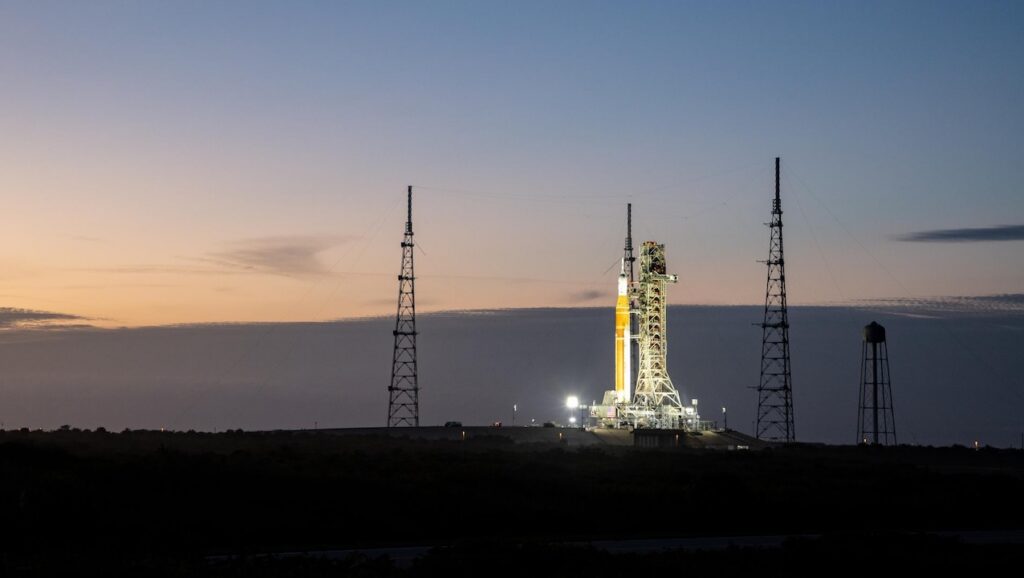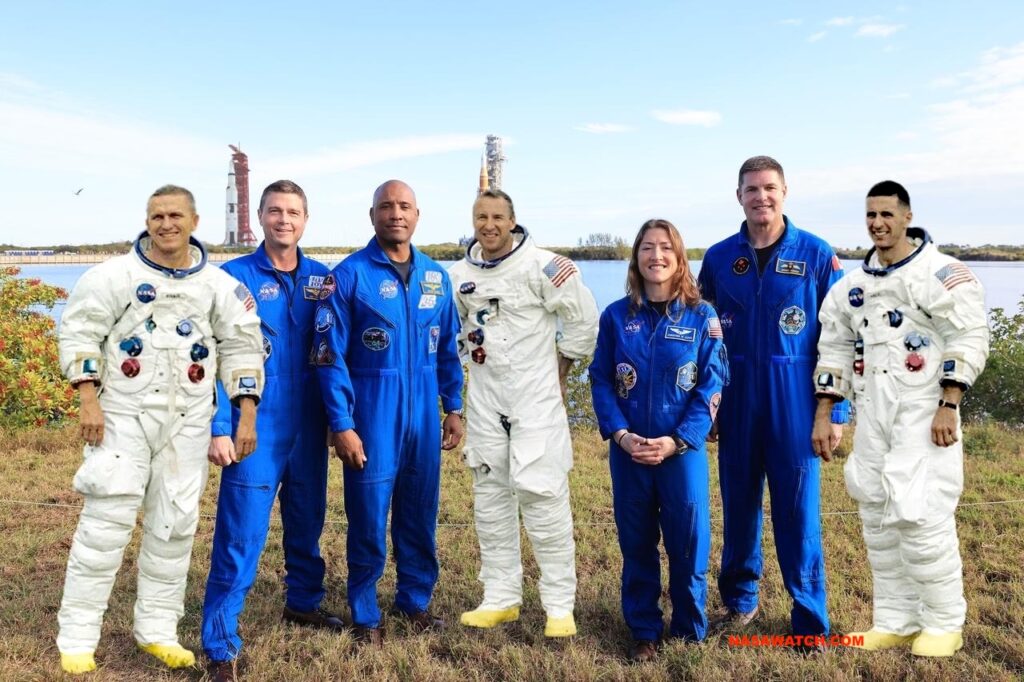Blue Origin Formally Protests NASA HLS Contract Award

Blue Origin Filed Protest With GAO Over NASA’s HLS Option A decision, Blue Origin
“Today, Blue Origin filed a protest with the U.S. Government Accountability Office (GAO) regarding NASA’s HLS Option A decision. Attached is a redacted copy of the protest. Additionally, here is a statement from Blue Origin: “NASA has executed a flawed acquisition for the Human Landing System program and moved the goalposts at the last minute. In NASA’s own words, it has made a ‘high risk’ selection. Their decision eliminates opportunities for competition, significantly narrows the supply base, and not only delays, but also endangers America’s return to the Moon. Because of that, we’ve filed a protest with the GAO.”
Redacted copy of Blue Origin’s formal protest, 175 pages, PDF
 Keith’s note: They say this, which has some inherent logic:
Keith’s note: They say this, which has some inherent logic:
“NASA’s selection of only a single provider based on the Source Selection Statement claim that “NASA’s current fiscal year budget did not support even a single Option A award” is inconsistent with NASA’s documented acquisition strategy and public statements. Additionally, with only a single HLS provider, NASA risks the Nation’s return to the Moon entirely on SpaceX’s ability to deliver its proposed solution – Starship and the new Super Heavy booster – despite the “immense complexity” and “high risk” NASA itself documented in the source selection rationale.”
But then 2 inches away on the same page they say this – which is simply a reflection of how Big Aerospace sees the world i.e. everyone needs to piece of the pie – even if it is more expensive – and requires funds that NASA simply does not have:
“This single award endangers domestic supply chains for space and negatively impacts jobs across the country, by placing NASA space exploration in the hands of one vertically integrated enterprise that manufactures virtually all its own components and obviates a broad-based nationwide supplier network. Such supplier consolidation cuts most of the space industrial base out of NASA exploration, impacting national security, jobs, the economy, and NASA’s own future options. Exacerbating this situation is the fact that SpaceX’s Starship uses the Super Heavy booster. Starship is incompatible with other U.S. commercial launch vehicles, further restricting NASA’s alternatives and entrenching SpaceX’s monopolistic control of NASA deep space exploration.”
Source Selection Statement, NASA
“My selection determination with regard to Blue Origin’s proposal is based upon the results of its evaluation considered in light of the Agency’s currently available and anticipated future funding for the HLS Program. Blue Origin’s proposal has merit and is largely in alignment with the technical and management objectives set forth in the solicitation. Nonetheless, I am not selecting Blue Origin for an Option A contract award because I find that its proposal does not present sufficient value to the Government when analyzed pursuant to the solicitation’s evaluation criteria and methodology.”









The moment Blue Origin hired Bob Smith, a legacy of Old Space, the game was up to get to orbit in a timely manner. Now Bezos has to settle for “sub orbital hops” every couple of months with the promise of sending tourists to sub orbit for a couple of minutes.
Blue Origin should have gone the transportation route first to build up experience in outer space, which they still don’t have even after more than a decade of manufacturing said rockets. They could have made money and improved designs in real time, as well as get vital PR. Imagine a world where Bezos brought over all the laid off staff of Bigelow Aerospace to manufacture private space stations for Blue Origin.
No, no, Gradatim Ferociter!
“They could have made money and improved designs in real time, “
How could they have made money? Who are they going to sell launches to with a rocket , that costs more than Falcon 9?
Apart from the fact that ULA’s making money with rockets that cost more than Falcon 9, why would Blue Origin necessarily be flying more expensive rockets? If they had moved faster, they’d have had some time competing with non-reusable Falcon 9, and there’s no reason they couldn’t have developed reuse and lowered their own costs just as quickly.
Even Virgin Orbit has a place on this plot. Blue Origin doesn’t:
https://twitter.com/SciGuyS…
Bezos has stated he didn’t build a rocket to compete in the satellite launch business. From day one he has talked about servicing manufacturers. I believe BO thought Bigelow would be in orbit by now and they would start making deals with manufacturers. They aspire to be a logistics company for manufacturers just like the role Amazon plays currently. Let manufacturers test on New Shepard, cut a deal and then partner up for LEO.
Things just have not proceeded as fast as planned. I did hear that Bigelow is going to start up again now though.
The New Glenn has a larger and more expensive high energy second stage so, like SpaceX, they will be expending the second stage. Last estimate I have heard on cost to build was it cost 28 mil for a F9 and 37 – 41 mil for a New Glenn.
“Bezos has stated he didn’t build a rocket to compete in the satellite launch business.”
So far, he hasn’t built a rocket that does anything.
“From day one he has talked about servicing manufacturers.”
That’s going to take the same thing launching satellites does: mass to orbit. This is nothing but a pathetic excuse for failure.
He built a reusable suborbital vehicle. The first ever. To be a failure he would have to first quit. As far as I know Blue Origin employees are still drawing checks and still working on the New Glenn. Unless you have information that BO has closed the doors and fired everyone.
More pathetic excuses. His suborbital toy isn’t getting any space stations built or supplied…that takes delivering mass to orbit.
Then I guess you are just going to have to show the richest man on the planet how to make a buck because obviously he doesn’t know how and will need you to help him.
The issue is not “making a buck”. It is, as it always was, getting to orbit.
lol now you are just being laughable .. not about making a buck? THAT is what you predicated your first comment on ..
“They could have made money”
Obviously it is about making money. What is the point of ANY commercial launch BUT to make money? Now you are trying to turn it into a launch to orbit is the end in itself, it isn’t. The point is to develop a launch system to make money launching it. So unless you have seen BO’s internal business plan you are simply blowing smoke.
Bezos is working on HIS timelines.. not yours.
It is about delivering mass to orbit cheaply and effectively. It has always been about that. No mass to orbit, no glorious O’Neill space habitats, no matter how many digits are in Bezos’ net worth.
Working on his own timeline? Bullshit. Bezos doesn’t set the timeline. Richest man or not, he can’t afford enough lawyers to hold everyone else back. He wants to be relevant, he needs to start putting mass into orbit.
and it would still beg the question .. what mass is he going to launch with a rocket that is more expensive pound for pound than the Falcon 9 . . companies are not going to rush to launch their hardware on a more expensive system than they have to. Bezos stated he is not after the sat market but wanted to launch for manufacturers that are operating in space stations.. ergo . no stations or manufactures YET .. no rush have a launch system until there is.
There will be no stations or space manufacture without cheap launch. If someone wants what he claims to want, what you claim he wants, then the very first thing they need is cheap launch. And as Musk pointed out, Bezos is having some performance difficulties in that respect…
NASA is betting on Musk to deliver and Bezos doesn’t like it. Too bad.
“Honest…if we knew the budget was smaller, we would have slashed our bid”
Which then naturally raises the question of just how grotesquely padded National Team’s original bid actually was.
It’s better and worse than that. From what NASA’s said, it seems the National Team’s bid was accurately costed. As in what they said it would cost was a fair estimate of what it would have cost them to do all the things they said they were going to do. On the other hand, that means they couldn’t reduce that cost significantly without not doing some of the things they had proposed to do, or by paying for more of the work out of their own pocket. But if the reduced the proposed cost by not doing all the proposed work, that would impact the technical merits of their proposal. And technical merit was the most important category for the selection.
I love that they though having a “broad-based national supplier network” is a good thing.
It’s not even good politics. They spread out production across multiple states and congressional districts to create as wide a constituency as possible, but then it results in delays which lead to order size reductions and such anyways. They’d be better off being a vertically integrated provider located in a swing state or key district.
I think Blue Origin might have a stronger case if they had flight ready hardware.
It’s kind of typical for these sort of big contracts are protested. Do they ever change anything?
They did in USAF’s tanker and rescue helicopter contracts. In both cases a rebid went to the previous loser. In the tanker case it was Boeing’s congressional lobby pushing HARD for it.
Yes but in those cases, the main provider was european.
I’ve seen it happen, in fact I’ve been involved (as a contractor) on both sides of the equation—protestor and protestee…it was almost unheard-of for protests to succeed, but it’s been happening the last 10-15 years or so.
I can’t see this protest going anywhere legally. Argument one that they should have awarded multiple suppliers because it lowers program risk is negated by the lack of funding to accept Blue’s bid. Argument two that they risk the economy is entirely outside the purview of a source selection contract. To me, this protest is symbolic and meant as a talking point for lobbying Congress. Sierra Nevada had a much stronger case when they lost to Boeing over the commercial crew contract – SNC was cheaper and had IMHO a better product. Blue offered a more expensive, less capable, and less developed technology.
Well said!
I also completely agree that Sierra Nevada should have been chosen over Boeing. Given Boeing’s performance I hope on the next bid Sierra Nevada will be given more consideration.
So much substance, given the vast orbital experience Blue Origin has.
Oh, wait…
The only grounds for protest that has any chance of being successful is if the Government did not follow the FAR process. Perhaps NASA didn’t follow the FAR, but I doubt it.
Neither SpaceX nor Blue Origin have their fully reusable super heavy boosters flying yet – but SpaceX on the whole is considerably ahead of Blue Origin in terms of regular space launches with Falcon and Falcon Heavy. Unless Blue Origin can do something dramatic, I’m tipping Starship-Super Heavy will beat New Glenn into orbit, and to the Moon. NASA needs a capability that can get a crew from Gateway to the surface and back again – SpaceX are better placed to achieve that. If Blue Origin want to compete for subsequent Artemis missions beyond Artemis III, they should present a better bid and show a record of performance in terms of space launch capability, as SpaceX has done.
Blue Origin hasn’t even announced that they intend to develop a fully reusable SHLV, and they’ve specifically denied having any such plans for New Glenn. There’s been vague notions of a larger New Armstrong to follow up New Glenn, with general assumptions that it would be fully reusable, but little of it exists beyond the name. They appear to be betting on Starship being a failure.
Excellent and accurate summary by Keith! Blue Origin is reaping what it sowed.
Musk has a recently proven and a lengthy track record of success. Space X is the only US company today with success in human spaceflight, designing, producing and operating new rockets and spacecraft. Boeing and Lockheed have shown that if they once had expertise, much of it has been squandered and they cannot be counted on. Blue Origin never had any of the proven expertise to start; they have never demonstrated an ability to design or build anything for space.
“SpaceX stole my lunch money”
The National Team could alternatively buy LEMs at museums, contract FHs to send them to the moon.
Nothing is stopping Blue Origin from completing development and building lunar landers on Mr. Bezos dime. NASA can buy rides if need.
One other observation. The filing states, “This single award endangers domestic supply chains for space and negatively impacts jobs across the country, by placing NASA space exploration in the hands of one vertically integrated enterprise that manufactures virtually all its own components and obviates a broad-based nationwide supplier network. Such supplier consolidation cuts most of the space industrial base out of NASA exploration, impacting national security, jobs, the economy, and NASA’s own future options.”
I’m not sure if I agree with that, and it’s something people could debate. But it has no place in legal objections to a NASA selection. NASA is not charged by either Congress or the President to worry about domestic supply chains, job impacts, how broad-based a company’s supply network is, or, for that matter, how selections would affect NASA’s future options. Those are certainly things that Congress and the President should consider. But NASA hasn’t been given any specific, legal instructions on those subjects. So NASA makes selections based on federal acquisition regulations and the things the President and Congress have actually told them to do.
In a legal objection to a NASA selection, those claims are nonsense. In the selection process, NASA did not consider issues which they are not legally allowed to consider. So? If Congress or the President had instructed NASA to consider things like job impact, that would be a different matter. But they didn’t. So I can’t see why those complaints from Blue Origin have any legal validity. I can’t see why they even mentioned them in a legal document, unless they just inserted them to help lobbying Congress rather than to add any legal validity to the filing.
Now you’re cooking.
I’m not so sure. Of course, challenging an award must be focused on specific, technical bid rules. But I’d like to address a larger policy issue.
I’m thrilled by the SX choice. Many, including Eric Berger, draw parallels to the transcontinental railroad, an apt comparison, while ignoring the fact that there were two companies competing for completion.
NASA’s role in supporting US technical prowess should surely be part of the equation? And what happened to the “dissimilar redundancy” ideas?
Focusing on redundancy, and by ignoring other proposal deficiencies, isn’t the nation better served by supporting alternative approaches of merit?
Some have pointed out – I’m thinking of several podcasts, including Orbital Mechanics and, especially, MECO, all pointing to NASA’s usual way of dealing with under-funded but committed programs: drop back, award development contracts, keep the ball rolling while encouraging alternatives.
This particular award is obviously hampered by proposals that are arguably and critically poor in several key areas; National’s vehicle is over-massed, for example. But the Big Picture remains clear.
It’s not as if the talented folks on the other teams won’t/ can’t be kept busy; so many enabling technologies remain to be resolved, including on-orbit refueling, among others. Still, the notion of ‘dissimilar redundancy’ is important